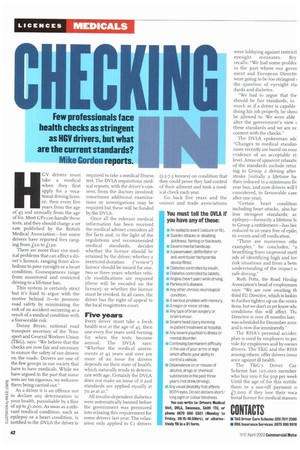E CK
Page 42

If you've noticed an error in this article please click here to report it so we can fix it.
Few professionals face health checks as stringent as HGV drivers, but what are the current standards? Mike Gordon reports.
HCV drivers must take a medical when they first apply for a vocational driving licence, then every five years from the age 0145 and annually from the age of Go. Most G Ps can handle these tests, and they should charge a set rate published by the British Medical Association—but some drivers have reported fees ranging from 120 to 1120.
There are more than ioo medical problems that can affect a driver's licence, ranging from alcoholism to poor eyesight or a heart condition. Consequences range from monitored and restricted driving to a lifetime ban.
This system is certainly strict but it's hard to argue with the motive behind it—to promote road safety by minimising the risk of an accident occurring as a result of a medical condition with a foreseeable risk.
Danny Bryan, national road transport secretary of the Transport and General Workers Union (T&G), says: "We believe that the checks are now fair and necessary to ensure the safety of our drivers on the roads. Drivers are one of the few groups in our society that have to have medicals. While we have argued in the past that some
w tests are too rigorous, we welcome 1 them being carried out." As a driver it is an offence not 1 to declare any deterioration in A, your health, punishable by a fine z of up to D,000. As soon as a rele
s vant medical condition, such as epilepsy or a heart condition, is notified to the DVLA the driver is required to take a medical fitness test. The DVLA requisitions medical reports, with the driver's consent, from the doctors involved; sometimes additional examinations or investigations may be required but these will be funded by the DV LA.
Once all the relevant medical information has been received the medical adviser considers all the facts and, in the light of the regulations and recommended medical standards, decides whether the licence should be retained by the driver; whether a restricted-duration ("review") licence should be issued for one, two or three years; whether vehicle modifications are required (these will be encoded on the licence); or whether the licence must be revoked. In all cases, the driver has the right of appeal to the local magistrates court.
Five years
Every driver must take a fresh health test at the age 0145, then one every five years until turning Go when the tests become annual. The DVLA says: "Whether the medical assessments at 45 years and over are more of an issue for drivers depends on their state of health, which naturally tends to deteriorate with age. Certainly the DVLA does not make an issue of it and standards are applied equally at 70 as at 21."
All insulin-dependent diabetics were automatically banned before the government was pressured into relaxing this requirement for some drivers last year. The relaxation only applied to Cm drivers (3.5-7.5 tonnes) on condition that they could prove they had control of their ailment and took a medical check each year.
Go back five years and the unions and trade associations
were lobbying against restricti eyesight measures. Bry recalls: "We had some probler in the past where our gavel ment and European Directiv were going to be too stringent I the question of eyesight sta dards and diabetes.
"We had to argue that the should be fair standards, in much as if a driver is capable doing his job properly, he shou be allowed to. We were able alter the government's view these standards and we are nc content with the checks."
The DVLA spokesman ack "Changes to medical standan more recently are based on soui evidence of an acceptable ri level. Areas of apparent relaxatic of the standards include retur ing to Group 2 driving after stroke [initially a lifetime ba then reduced to a minimum fly year ban, and now drivers will I considered, in favourable case after one year].
"Certain heart condition including heart attacks, also hal less stringent standards; an epilepsy—formerly a lifetime 13: to Group 2 entitlement—has bee reduced to to years free of epilel tic events and off medication.
"There are numerous otht examples," he concludes, "a benefiting from improved metl ods of identifying high and by risk situations and from a bent understanding of the impact o safe driving."
Ruth Potts, the Road HaulaE Association's head of employmen says: "We are now awaiting th third EU Directive, which is lookin to further tighten up on the restrif tions, but we don't as yet know whi conditions this will affect. Thm Directive is over 18 months late; was scheduled for December 200c and is now due imminently."
The RHA's personal acciden plan is used by employers to prc vide for employees and by ownei drivers. The T&G and the RHA among others, offer drivers instil ance against ill health.
The MG 's Driver Car Scheme has 120,000 member who buy into it for sop per week Until the age of Go this entitle them to a one-off payment o £7,000 if they lose their voca lima' licence for medical reasons






















































































































































